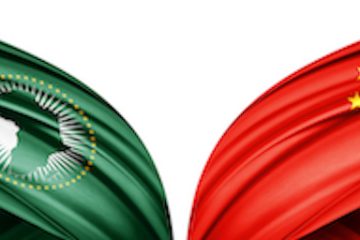
Bridging State Responsibility and Opportunities as African Countries Join in the Digital Silk Road
In 2015 China launched the Digital Silk Road (DSR hereafter). The DSR is an essential part of the One Belt, One Road (BRI) strategy with significant domestic and foreign policy objectives. China has made enormous investments that have allowed it to achieve rapid technological advancement and economic growth. As of 2021, Chinese firms were three of the world’s largest technology companies by revenue. According to the World Intellectual Property Organisation (WIPO), in 2020 China reported 1.5 million patent applications, 2.5 times more than the second leading country, the United States. The DSR is part of China’s plan to spread its technical and proprietary knowledge by building telecommunications, data, and financial infrastructure in countries participating in the BRI. The Nigerian digital …

Why Strengthening the Rule of Law Matters in Transitional Justice: Lessons from Colombia
Since the end of the Cold War, Transitional Justice (TJ) has become the dominant framework informing peacebuilding when wars end. Each year, countries establish TJ systems to come to terms with a violent past. However, TJ rarely lives up to its promises. Criticism of TJ often focuses on its (in)ability to heal the wounds of violence, foster forgiveness and reconciliation in divided societies, or deliver restorative justice for both the victims and victimisers of a conflict. In this piece, I shed light on an often-overlooked limitation of TJ: its disregard for the Rule of Law (RoL). RoL, understood as a principle of governance by which law governs societies, is often seen to belong outside the remit of TJ. This is …
OxPol Blogcast Episode 7: Latin America’s Emerging Debt Crisis
Welcome to the OxPol Blogcast, a podcast where we will be sharing research, analysis, and experiences from members of the University of Oxford’s Department of Politics and International Relations. On each, episode we will talk to a guest about a piece they’ve written for the OxPol Blog. Then, we’ll discuss their larger research agenda, their insights on conducting political science, and their time at Oxford. On this episode of the OxPol BlogCast, host Chase Harrison talks to DPhil student Christoph Sponsel about Colombia’s credit rating, the Latin American debt crisis of the 1980s, and doing work at the intersection of political science and economics. Read the original blog post here: https://blog.politics.ox.ac.uk/colombian-mass-protests-foretelling-an-emerging-latin-american-debt-crisis/
When Attempts to Change Institutions Fail: The Case of the Affordable Care Act
The U.S. Supreme Court’s recent decision to uphold the Affordable Care Act (ACA, also known as Obamacare) is the latest in a series of failed attempts by Republicans to repeal the law. From its passage in 2010, the ACA has been responsible for reducing the uninsured population significantly through its key provisions requiring individuals to purchase health insurance, extending coverage for individuals with pre-existing conditions, and expanding Medicaid for low-income Americans¹. Republican legal challenges to the ACA started within hours of its signing. Filed by states, associations, and individuals, several cases made it to the Supreme Court, which rejected challenges to the ACA in 2012, 2015, and, most recently, June 2021. These legal defeats coincide with other failed attempts by …
Colombian Mass Protests: Foretelling an Emerging Latin American Debt Crisis?
S&P, a global credit rating agency, recently downgraded Colombia’s credit rating to a non-investment grade, implying that Colombian government bonds are now high-risk financial assets. The downgrade hit the country amid a wave of mass unrest. For over a month, Colombians spanning all strata of society protested in large numbers. Sparked initially by opposition to a government-proposed tax reform, which President Ivan Duque soon retracted, protesters expressed diverse demands, including calling for the Duque administration to resign, a series of social and economic reforms, a thorough implementation of Colombia’s 2016 peace agreement, and an end to police brutality. Protesters thus have called for nothing less than a complete overhaul of Colombia’s political and economic system. The protests form part of …
Why Police Reform Won’t Do the Trick in Colombia
Times are grim for human rights and the rule of law in Colombia. Since the end of April, tens of thousands of Colombians have taken to the streets after President Iván Duque announced a controversial tax reform. While the government has withdrawn the reform proposal, protests are ongoing as citizens express their frustration over structural inequalities. Discontent is high across the country, especially among lower- and middle-class Colombians who have experienced increased hardship while enduring the COVID-19 pandemic. By 22 June, 83 people were killed and over 1,600 wounded, with much of the violence attributed to the Colombian National Police. The police’s anti-riot unit, known as ESMAD, has become a symbol of disproportionate policing based on the excessive use of force. The Constitution …
OxPol Blogcast Episode 5: Biden’s North Korea Policy
Welcome to the OxPol Blogcast, a podcast where we will be sharing research, analysis, and experiences from members of the University of Oxford’s Department of Politics and International Relations. On each, episode we will talk to a guest about a piece they’ve written for the OxPol Blog. Then, we’ll discuss their larger research agenda, their insights on conducting political science, and their time at Oxford. On this episode of the OxPol BlogCast, host Chase Harrison talks to Stipendiary Lecturer in Politics Edward Howell about Biden’s policy on North Korea, regional relations around the Korean Peninsula, and exact you conducts research on a notoriously closed off country like North Korea. Read the original blog post here: https://blog.politics.ox.ac.uk/washington-and-pyongyang-back-to-square-one/

Jihad in the City: Militant Islamism and Contentious Politics in Tripoli- Author’s Q&A
We interviewed Raphaël Lefèvre about his new book Jihad in the City: Militant Islamism and Contentious Politics in Tripoli, available now. OxPol: What motivated you write your book? Raphaël Lefèvre: I wanted to shed light on a little-known historical event with large contemporary echo: the creation by a militant Islamist movement of an “Islamic Emirate” on the city of Tripoli, Lebanon in 1982-1985. This movement has modern parallels with the “Islamic Caliphate” created by ISIS in parts of Iraq and Syria after 2014 and with similar attempts by Al-Qaeda to create “Islamic Emirates” on the territories it has sporadically controlled recently, from Southern Yemen and Northern Mali to Northern Syria. I am not suggesting that the 1982-1985 “Islamic Emirate” in Tripoli …









